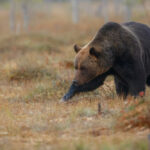In the serene expanse of the Thula Thula game reserve in the KwaZulu region of South Africa, the home of the late Lawrence Anthony stands as a testament to the enduring bond between humans and wildlife. Anthony, a revered author and conservationist, passed away on the 7th of March, 2012. His life’s work had profound implications, not just for the animals he sought to protect, but also for the very concept of wildlife conservation. Mere days after his demise, a heartwarming episode unfolded — two herds of wild elephants, whom he had painstakingly rehabilitated from violent behavior that almost sentenced them to death, made a pilgrimage to his home. Without a sound, they held a vigil for the man they recognized as a protector, staying for two full days before returning to the wilderness from which they came.
Françoise Malby-Anthony, Lawrence’s wife, witnessed this extraordinary event and has since observed the elephants returning each year on the anniversary of his death, a moving ritual that underscores the deep-seated recognition and memory these majestic creatures possess.
The Presence of Two Elephant Herds at Thula Thula
The presence of the two elephant herds at Thula Thula was a result of Anthony’s unexpected role as their guardian. His son, Dylan Anthony, recounted the arrival of the herds at their family compound shortly after his father’s death, a visitation that broke their pattern of absence for the last year and a half. The journey they undertook to reach the house was a 12-hour testament to their bond with Anthony. Arriving one herd after the other, they lingered around the compound for approximately two days, as if to ensure their message of respect and gratitude was felt before they merged back into the bush.
It was not always so that elephants were part of Thula Thula’s ecosystem. In fact, Anthony had never planned for it. Yet in 1999, fate intervened when he was approached to provide sanctuary to a herd of ‘troublesome’ elephants. These elephants had a history of breaking out of enclosures and were consequently on the brink of being put down. Taking a stand against what would have been a tragic fate, Anthony accepted the challenge, setting the stage for one of the most remarkable wildlife rehabilitation stories.
“The Elephant Whisperer” Book
“The Elephant Whisperer,” a book by Anthony, captures the essence of his relationship with these intelligent beings. In it, he recounts a pivotal moment at dawn, standing before Nana, the matriarch. With an electric fence charged with 8,000 volts as their only barrier, Anthony spoke to her, imploring her to see Thula Thula as their new home, to choose life over an escape that would mean certain death. He recalled the surreal nature of the moment, communicating with an agitated wild elephant as if in conversation. It was a dance on the razor’s edge, where the wrong move could have meant disaster.
His narrative detailed the standoff where, for a moment, recognition flickered between man and beast, a connection that led to Nana backing down and leading her herd away from potential peril. This incident was not just a close escape; it was the beginning of a deep mutual understanding and trust. Even after Lawrence Anthony’s death, the work at Thula Thula continued to thrive, thanks in large part to the commitment of Malby-Anthony. The reserve is expanding, making room for the flourishing elephant herds and contributing to the local economy. The Royal Zulu project is one such initiative, aiming to annex additional land to Thula Thula to facilitate further conservation efforts.
Anthony’s approach to conservation went beyond the mere protection of animals; it was about changing the narrative surrounding human and wildlife interaction. He believed in the intrinsic value of all living creatures and fought for their right to coexist with humans. This ethos is encapsulated in a poignant sentence he once wrote: “Until we allow not only elephants, but all living creatures their place in the sun, we can never be whole ourselves.”
To wrap up
This sentiment echoes through Thula Thula’s sprawling lands and in the continued efforts to preserve and cherish wildlife. The silent vigils by the elephants, their annual pilgrimages, and the ongoing work at the reserve all stand as living tributes to Lawrence Anthony’s enduring legacy. His life and work continue to inspire a universal message of respect and empathy for the natural world, a message that is as much about conservation as it is about the connection all living beings share with one another.
Through his actions and words, Anthony has shown that the bond between humans and animals is not just about control or stewardship but about understanding, respect, and ultimately, about the harmony that can exist between all creatures on this Earth. Thula Thula, with its thriving herds and expanding boundaries, remains a beacon of hope, demonstrating what is possible when one man’s passion for life transcends the boundaries between species.

